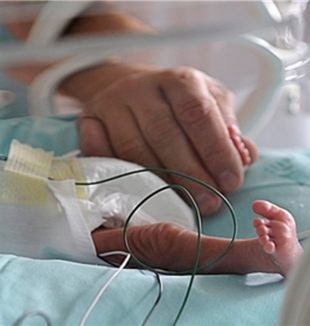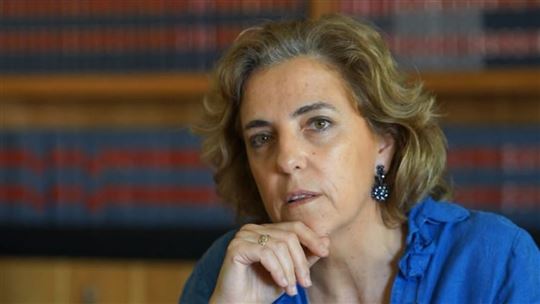
With your heart at work/3: Dr Janjão's "balm”
A neonatologist in a hospital in Lisbon, always surrounded by mothers, colleagues, nurses…She tell us how faith is involved with what she does each day. And how, even in a place of suffering, it can help build hope...Maria João Leitão, also known as Janjão, is a neonatologist. She has worked in the Intensive Care Unit of the Dona Estefania Hospital, in Lisbon, since 2004. There, she supervises difficult pregnancies, infants in extreme conditions, and their parents. She is also a mother, with four children, and she often ends up working 24-hour shifts in order to be with her young patients, who are often born only to live a few hours, or minutes. Others spend months, if not years, in hospital. And next to them, everyday, are their mothers.
"The experience I had before coming here has helped me a lot," she says today. Previously, for five years, she had worked as a paediatrician in a small provincial hospital, where she understood what was essential. "There, I began to get to know the families of the children, to become aware of their lives, so complicated yet so rich. Being a small hospital, there was a great feeling of community, both amongst us colleagues, but also with the parents. The team, made up of nurses, therapists and physiatrists, was very close to the families. So I learnt the importance relationships.”
When she arrived in Lisbon, she desired something similar, so much so that she asked to set up an outpatient clinic, even though its not compulsory in an intensive care unit. "It immediately filled up. Thus, I began to meet children and their parents. In these years, I saw the same possibility of communion happen again, first of all between us colleagues, in a place where there is usually a sort of distance between doctors and nurses". The secretary, for example, has set up a "party fund" to which each member of the team can contribute freely: "With this money, she buys a gift every time it’s a mother’s birthday or a baby is one month old. A card never lacks also when a child dies- which, unfortunately, happens often”.
By being near to the mothers, Janjão realized one thing. She saw them live immense dramas and was struck that their questions were usually very simple: how much did the child weigh, if they had been bathed…Over time, she discovered that they spend entire mornings thinking about what to ask the doctors and nurses, in an attempt to ask questions whose answer will not be painful. "They may seem alienated, or deluded. Instead, they are just trying not to suffer. Almost as if, by not saying certain words, their heart will not break, the door of the future will not close and the light of life will not go out".
Because of all this, Janjão sets aside enough time for meetings with the parents, so that they have at least an hour to talk: "Sometimes it’s enough just to ask them what worries them. And this is not to be taken for granted, because we, doctors, often forget to do this.” For her, being with the parents is not "being in front of a "difficult situation" or the family member of a sick person, but is being in front if a heart that is identical to mine".
She is helped by the School of Community, which she never forsakes, even if it often means running there after a full-day shift: "It acts like a balm in the middle of my days. It helps a new gaze penetrate everything.” It opens you up to the possibility of "responding to the circumstance in front of you", whatever it may be. And it may be that the answer is as simple as an invitation to have a cup of tea. "Everything is worthwhile when we open our heart to another heart", Janjão points out: "We must never think that there is something to do that’s not important". That's what happened in their ward.
They realized that for many mothers, especially foreign ones, the one-to-one relationship was difficult, so they refused individual help: "We arranged a more informal get-together, of companionship, to facilitate their freedom to ask for help". At the first meeting, they asked them what they needed and they were not expecting their answer: "A hairdresser and manicure". They stay in the hospital every day, alongside their children, for weeks, months, sometimes years. "And then, a mother said that she lacked a place where to have tea with someone”.
From this, together with the psychologist and support nurse, she set up "moms' tea". They began to meet every day, at 3.30 p.m., when the nurses’ shifts changed: from biscuits to songs, to Christmas snacks, to familiarity, trips and a WhatsApp group, "here they share photos of the first bath, news about the operations, a smile, the first meal…”, says Janjão: "Things that are trivial for many families, but that, here, are not taken for granted. They are hope”.
"Here, we meet people. This makes all the difference," said Ana, after spending five months in the hospital where she experienced the death of her child and the daily struggle of its twin to survive: "I’ve grown as a person," she says, who has tried to deal with everything by herself, refusing the psychologist’s support, talking as little as possible and not asking questions. She wanted to convince herself that everything was fine. But, at a certain point, she couldn't go on like that and said yes to another mother's invitation: "Shall we have tea together? We can't suffer alone.”
READ ALSO - With your heart at work/2: Miracles in Hollywood
Over time, even hospital procedures have been affected by these relationships, for example the relationship with the chaplain: "He started to come often, to be with the parents, even non-believers”, says Janjão: "He has become an important presence for everyone. So much so that a new attention had been born towards Baptism: before they were done in a slightly improvised way, done however it was possible, but today we have a registry especially for Baptism and – in the emergency cart - a bottle of water that has been blessed by the relics of the little shepherds of Fatima. After all, Jacinta was admitted to this hospital...".